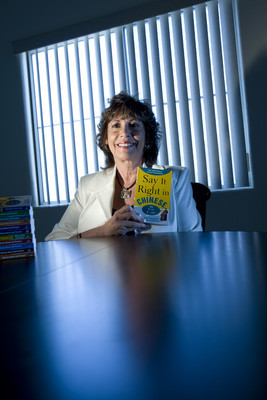Henderson firm helps U.S. athletes say ‘ni hao’

International travelers know the scenario: The hapless foreigner wants to ask locals where he’ll find a bus stop, but thanks to his mangled translation, he inadvertently queries about the nearest whorehouse. Hilarity ensues, unless he’s in Pahrump or Amsterdam.
Sure, it’s funny, especially when it didn’t happen to you.
But linguistic mix-ups aren’t so amusing when they involve national identity and pride.
That’ll be the case in August, when thousands of American athletes, along with U.S. Olympic Committee officials and staffers, head to Beijing for the 2008 Summer Olympics.
When they leave, they’ll be toting 600 copies of “Say It Right in Chinese,” a Mandarin Chinese phrase book that Henderson-based Easily Pronounced Language Systems wrote and published to guide Americans around potential language pitfalls.
It’s a small contract — just $6,000 in books — but the deal could prevent some big misunderstandings, said Betty Chapman, president of EPLS.
In Chinese, merely pronouncing vowels properly isn’t enough; the “sing-song” nature of Chinese means speakers also must learn proper tones and inflections, Chapman said. A wrong tone or an improper cant can render a comment unintelligible or, worse, inappropriate.
Most phrase books explain the importance of tone, she said, but they don’t show travelers how to use tone on the spot. EPLS developed a proprietary visual system to help readers nail tones mid-sentence, as they read from their phrase books.
Clyde Peters, author of “Say It Right in Chinese,” pointed vowels on an upward diagonal for upward tones and a downward angle for downward tones. High-toned vowels sit slightly above the text baseline, while low-toned vowels rest just below it. That allows the reader to know the right tones visually and immediately.
“If you’ve made the purest sound possible, you have the best chance of actually being understood,” Chapman said.
“Say It Right in Chinese” also gives readers the heads-up on a few linguistic customs they’ll come across in Beijing.
It lets them know that, while Chinese athletes perform, their fans will issue constant cries of “Jia you!,” which means, “Wonderful, terrific!”
When Chinese ask how you’re doing, readers will find in the phrase book a translation of the standard American response, “I’m fine.” But they’ll also see an explanation of and translation for “Horse horse, tiger tiger,” the colloquialism that serves as the typical Chinese answer.
“It’s neat when you’re a visitor to be able to break the ice that way,” Chapman said. “They say, ‘This person gets it.’ Chinese people are shocked (at the response) because it’s their world.”
EPLS is part of a surge in Silver State companies conducting international business, said Mike Skaggs, executive director of the Nevada Commission on Economic Development, an economic diversification agency that maintains a global trade and investments division to help area companies make the leap overseas.
Global business is the fastest-growing sector of the economy, Skaggs said, as the weak U.S. dollar makes American goods more affordable to overseas markets. Nevada-based companies supply alfalfa to China and onions to Mexico.
Nevada exports jumped 10 percent in the most recent quarter compared with the same quarter a year earlier, he said. Mining exports rose about 7 percent. Shipments of industrial equipment rose 70 percent.
Businesses want to go international because it diversifies their client base and provides more stable growth.
“If they serve the domestic market, they’re only going to grow so much, because it’s a finite market,” Skaggs said. “When we can add a global dimension, that’s a huge marketplace that allows them to find a niche where they can be successful and grow as much as they want.”
EPLS isn’t the only Nevada company with a prominent profile in the Olympics. Duraflex International of Sparks made the diving boards for the games’ diving competition. Minden-based landscape-architecture firm Designing with Nature helped conceptualize a four-mile mural in Beijing’s International Sculpture Park.
“The big message the Olympics has for domestic companies in Nevada is: Think China,” Skaggs said. “China has a big appetite for American goods right now.”
EPLS broke into the global world of Olympics vending by donating 800 Greek phrase books to U.S. media during the 2004 Summer Games in Athens. The books earned “rave reviews,” Chapman said.
The company followed up with an Italian edition for U.S. Olympic Committee staff members attending the 2006 Winter Games in Torino, Italy.
EPLS began working in earnest on the visual concept for its Chinese phrase book in 2006, about a year after McGraw-Hill Cos. agreed to serve as its imprint. The U.S. Olympic Committee’s order for the games came through June 2. In addition, USOC officials just invited EPLS to become a sponsor of the U.S. Olympic team.
EPLS hasn’t relied solely on global markets for its business. The company, which has produced 11 phrase books, supplied Spanish versions to fire and police departments in Southern Nevada and San Francisco, and it sold books to security staff at local casinos.
Vancouver, Canada, is hosting the next Olympics, in winter 2010, and unless Americans need help translating terms like “Canadian bacon,” “Molson Golden,” “hoser” or “eh,” EPLS will focus on other initiatives.
The company recently published its Egyptian Arabic phrase book, and an Iraqi Arabic version, possibly for the U.S. military, is in the works. Authors also are writing a Hebrew phrase book.
World peace, anyone?
Contact reporter Jennifer Robison at jrobison@reviewjournal.com or 702-380-4512.
ON THE WEB:“Say It Right” phrase books












